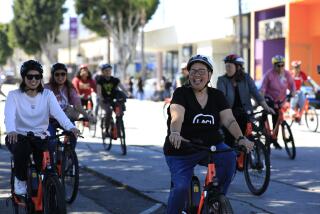Bird’s newest scooter is for sale — and it comes in rose gold

L.A. Times Today airs Monday through Friday at 7 p.m. and 10 p.m. on Spectrum News 1.
- Share via
Bird Rides Inc. will release Wednesday a new electric scooter model in Los Angeles and Santa Monica that it hopes will outlive its predecessors — and find a market among scooter riders who want to purchase a Bird of their own.
The Bird One is more durable than its predecessors, the company says — which is key to the start-up’s bottom line.
And in a change for the Santa Monica company, riders will be able to buy the Bird One outright for $1,299 in classic black as well as two colors unavailable to the scooter-sharing public: Dove White and Electric Rose, an array of colors familiar to any iPhone fan.
“We think it’s by far the sexiest scooter on the market,” said Travis VanderZanden, Bird’s founder and chief executive.
It marks the fifth scooter model that Bird has deployed on the streets, but only the second that the company designed in-house, out of its Culver City R&D center.
“We always knew we would have to go deep in the hardware business,” VanderZanden told The Times. “Early on when I started importing scooters on Alibaba, it was pretty clear that the hardware that existed at the time wasn’t going to cut it for a real commuter.”
Or, as it turns out, the company’s balance sheet. The consumer models from Xiaomi and Ninebot that Bird distributed across the world, fueled by hundreds of millions of dollars of venture capital, broke down before the company could break even on the cost of purchase, charging and maintenance.
Can Bird build a better scooter before it runs out of cash? »
The company also announced that it has stopped buying those consumer models entirely and will phase them out of its scooter-sharing network over the coming months. (The original Bird model, the Xiaomi m365, will remain available for monthly take-home rental in certain markets.)
A Times investigation found that the life span of some Bird Zeros — the company’s first in-house model — averaged nearly four months. Bird disputes the estimate, which was based on data pulled from the company’s smartphone application.
VanderZanden said Bird Zeros last an average of 10.6 months out on the streets.
“Which is exciting, because that means it’s profitable for us,” VanderZanden said. “And for Bird One, we’re just starting to roll it out tomorrow, but we project that its life span is going to be over 12 months.”
The company says its Bird One has improved battery life over its predecessor, with a 30-mile range per charge, versus the 20-mile range that some field testers found in the Bird Zero. Those gains come without a significant increase in weight, the company said. It also has improved semi-pneumatic tires, a wheel lock enabled by smartphone, and the ability to climb a 15% grade, the company said.
Bird’s core business remains dockless scooter rental, but VanderZanden said the company had found that some riders were interested in owning their own two-wheelers.
“Roughly 80% of the market is going to continue to be on the shared side of the business,” VanderZanden said. “But we think there is roughly 20% of the market that’s going to want to own a scooter.”
Scooter rental start-ups are toying with new approaches in a market where competition is fierce and brand loyalty is low. Among the challenges: regulators who don’t like scooters left on sidewalks and a public with a tendency to vandalize their products.
Selling directly to consumers could bypass those challenges, though Bird must now convince buyers to shell out a premium price. Bird’s original Xiaomi models retail for around $500.
One selling point: The Bird One comes with a one-year warranty, with repairs handled by Bird’s existing network of mechanics, and purchasers will also receive $100 in rider credit to use with Bird’s dockless fleet.
Follow me on Twitter: @samaugustdean







